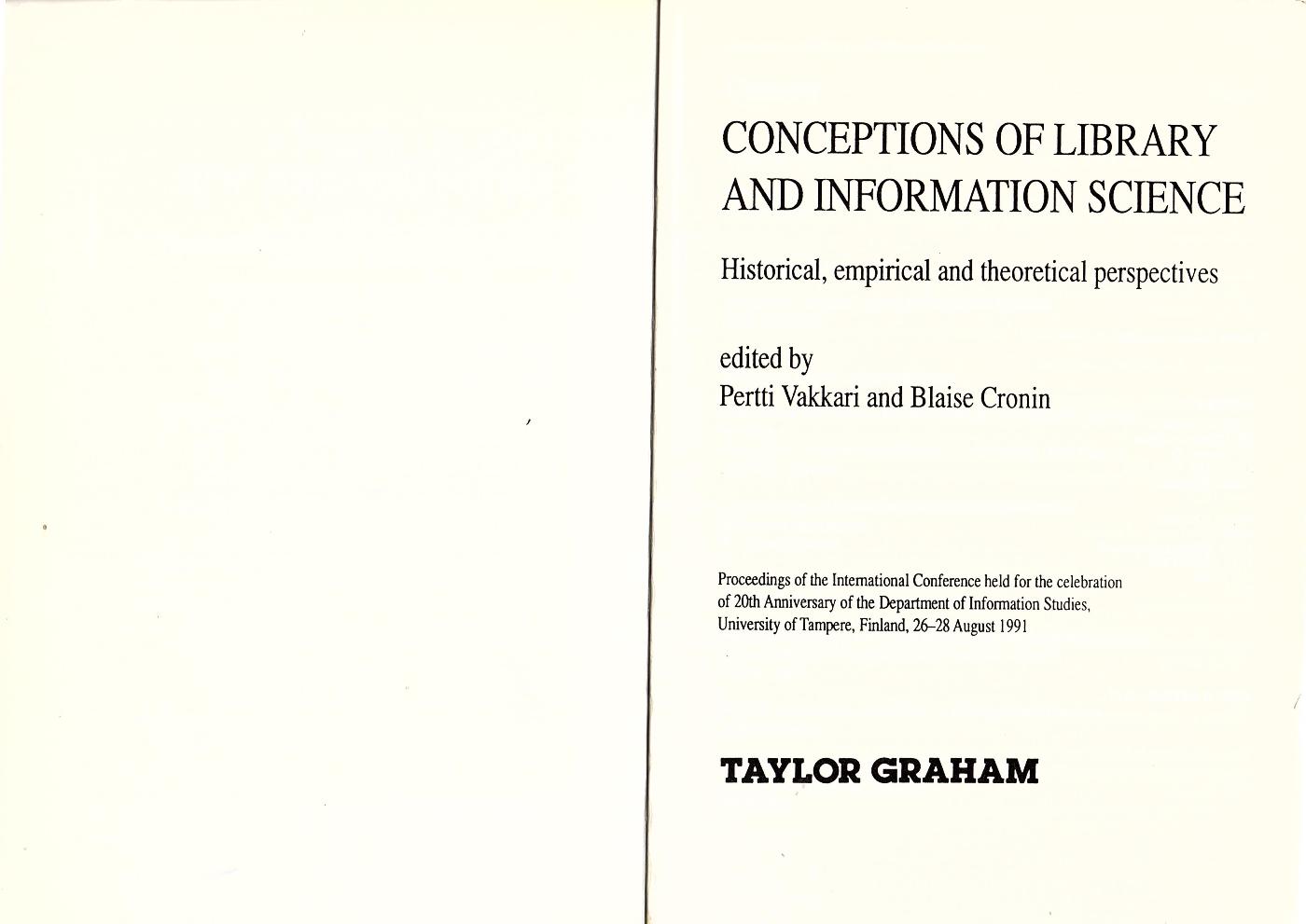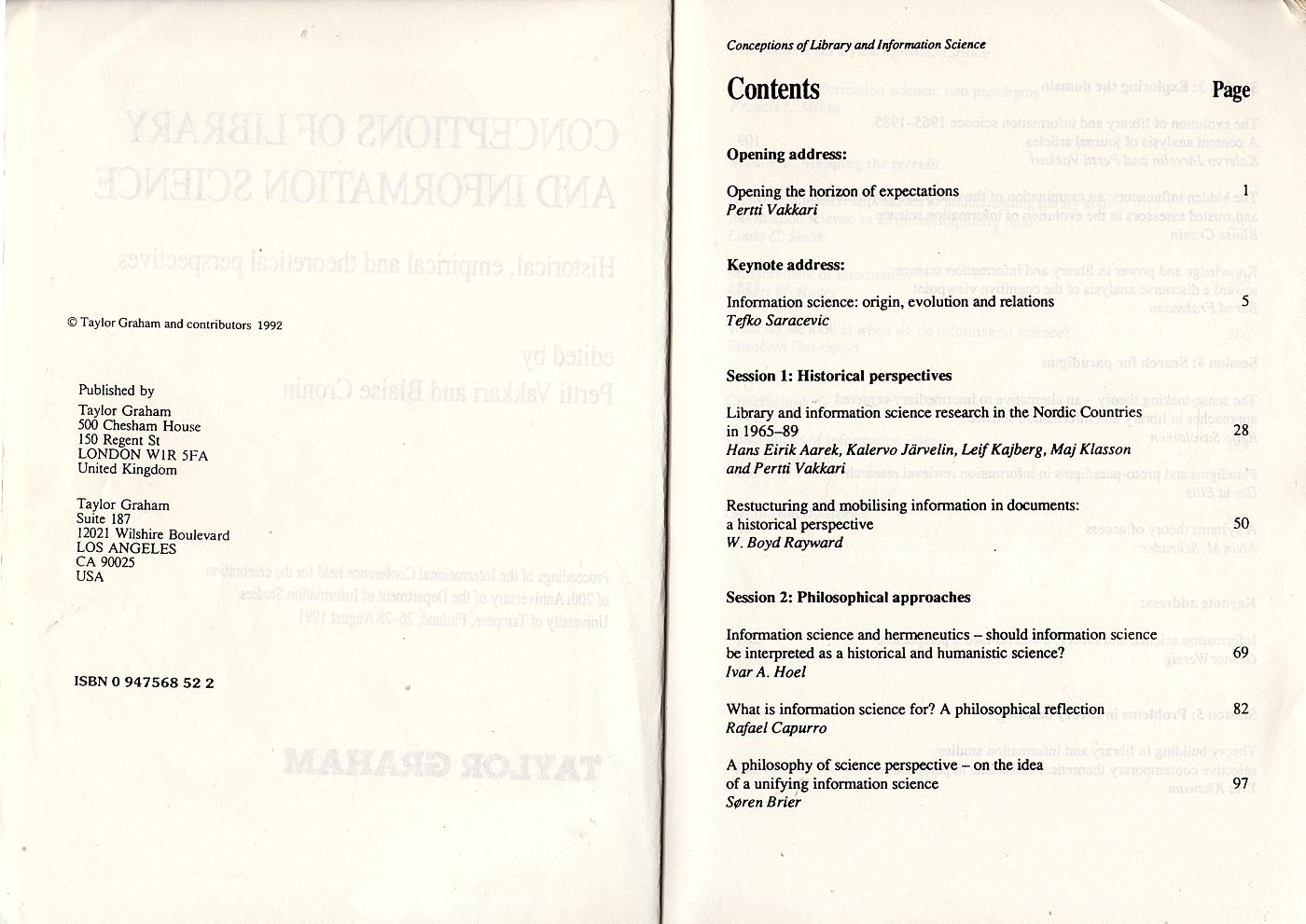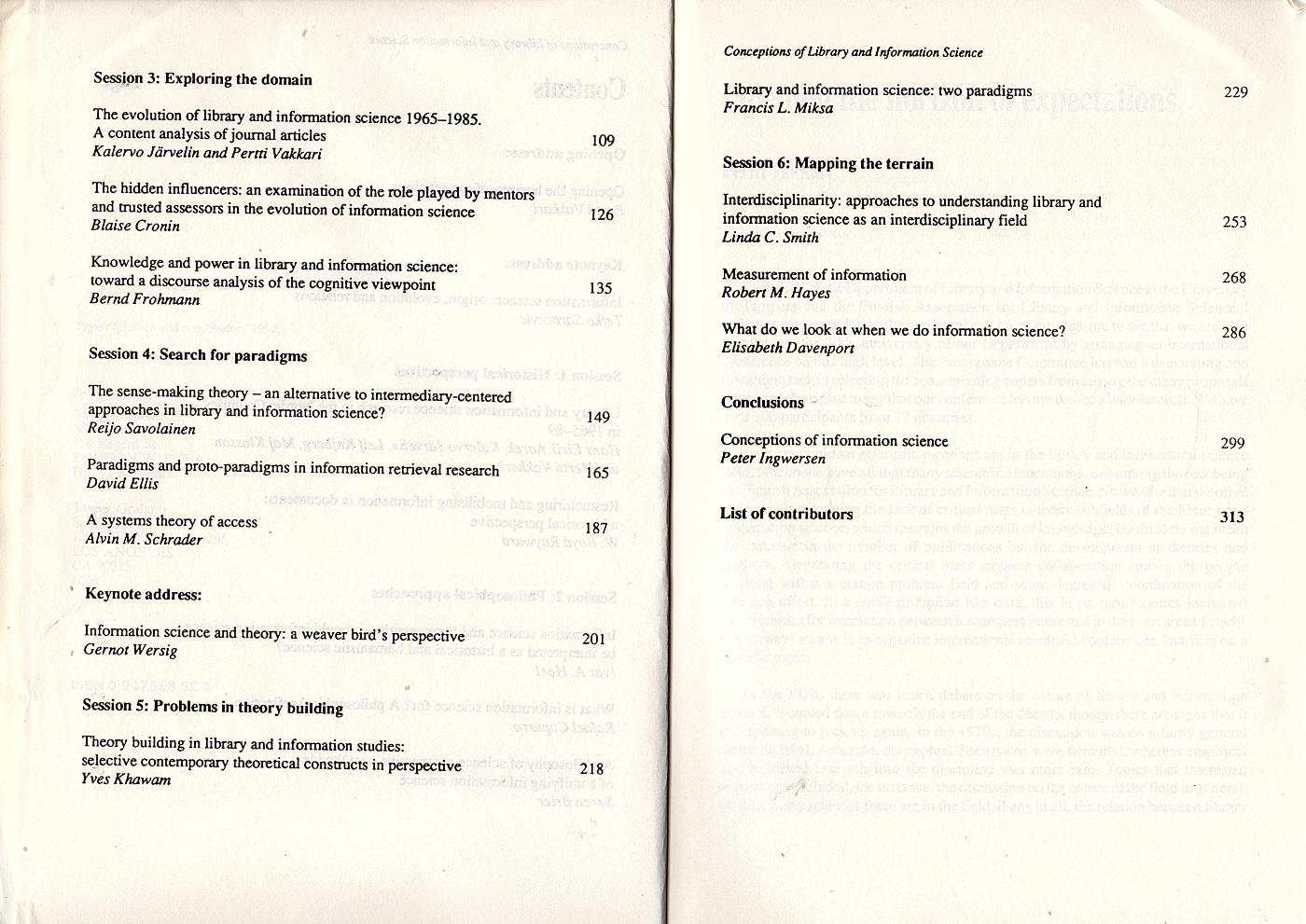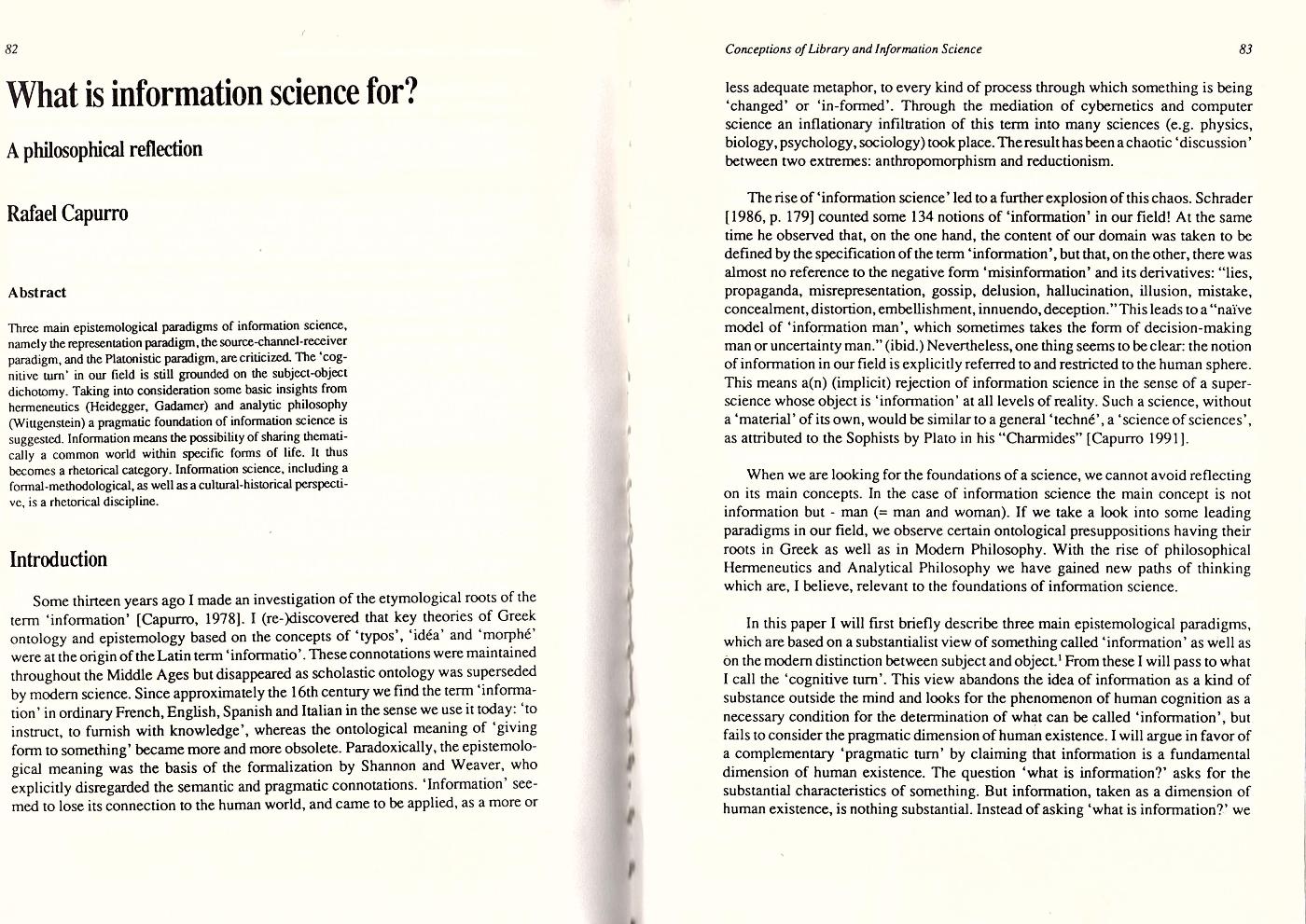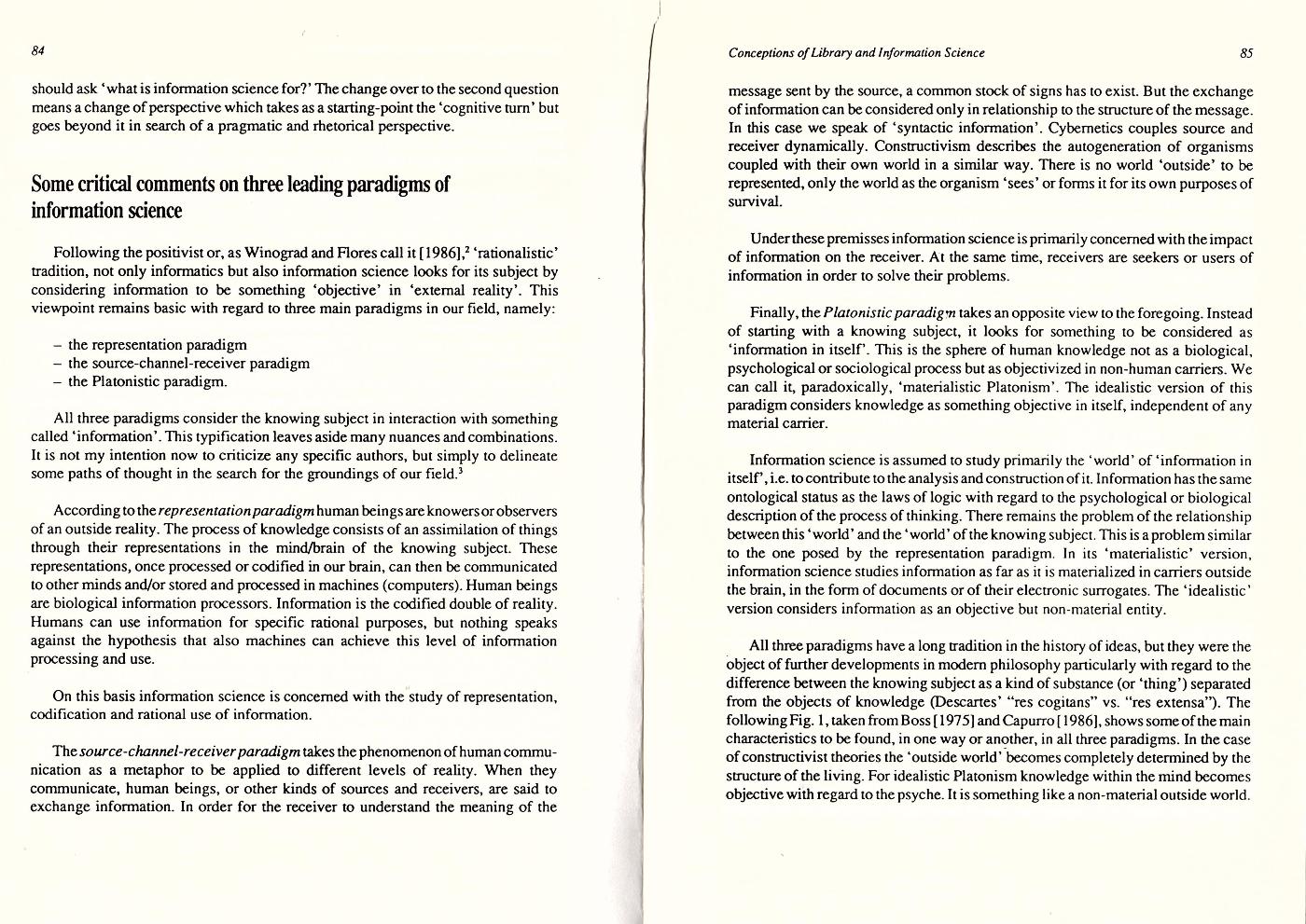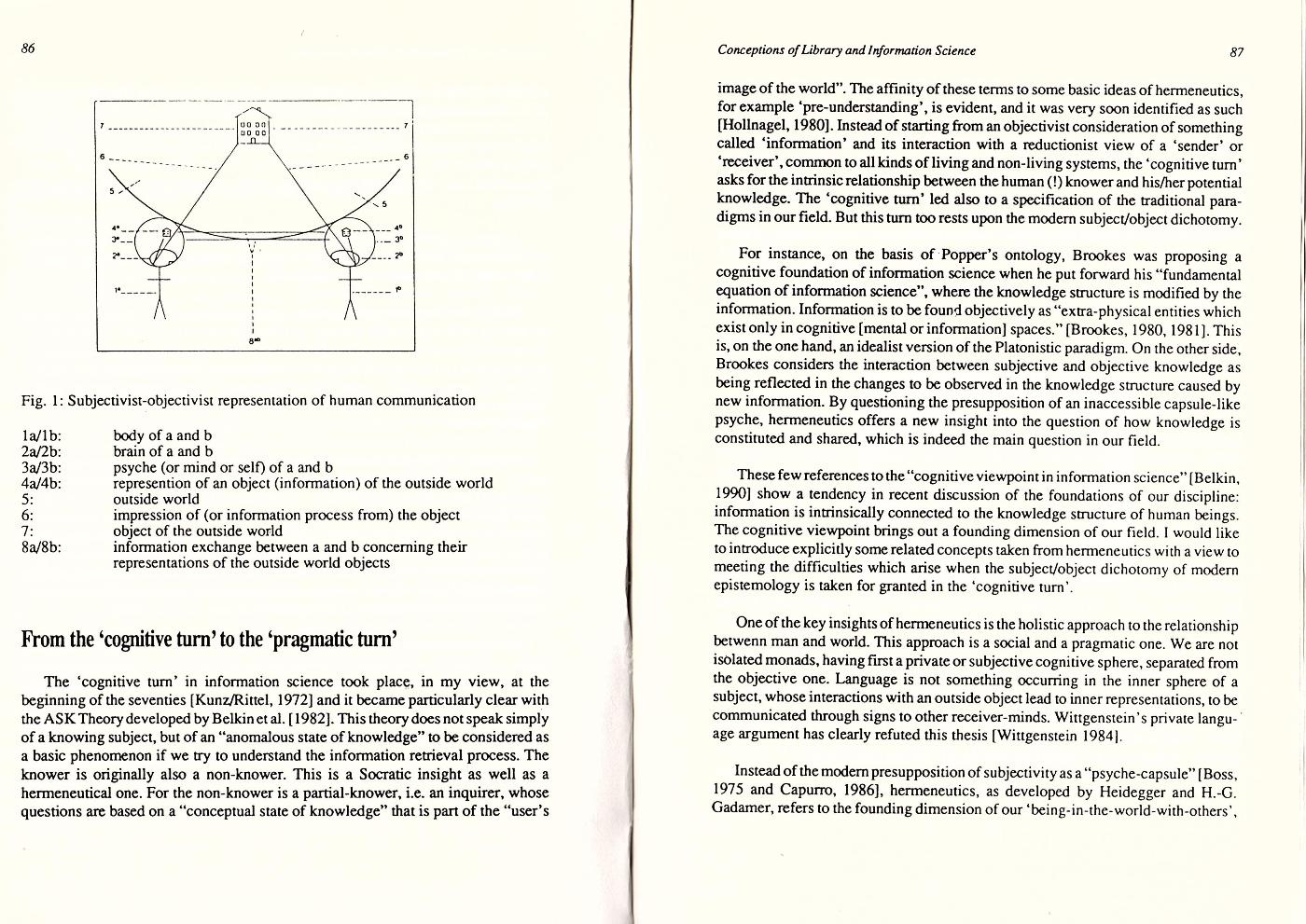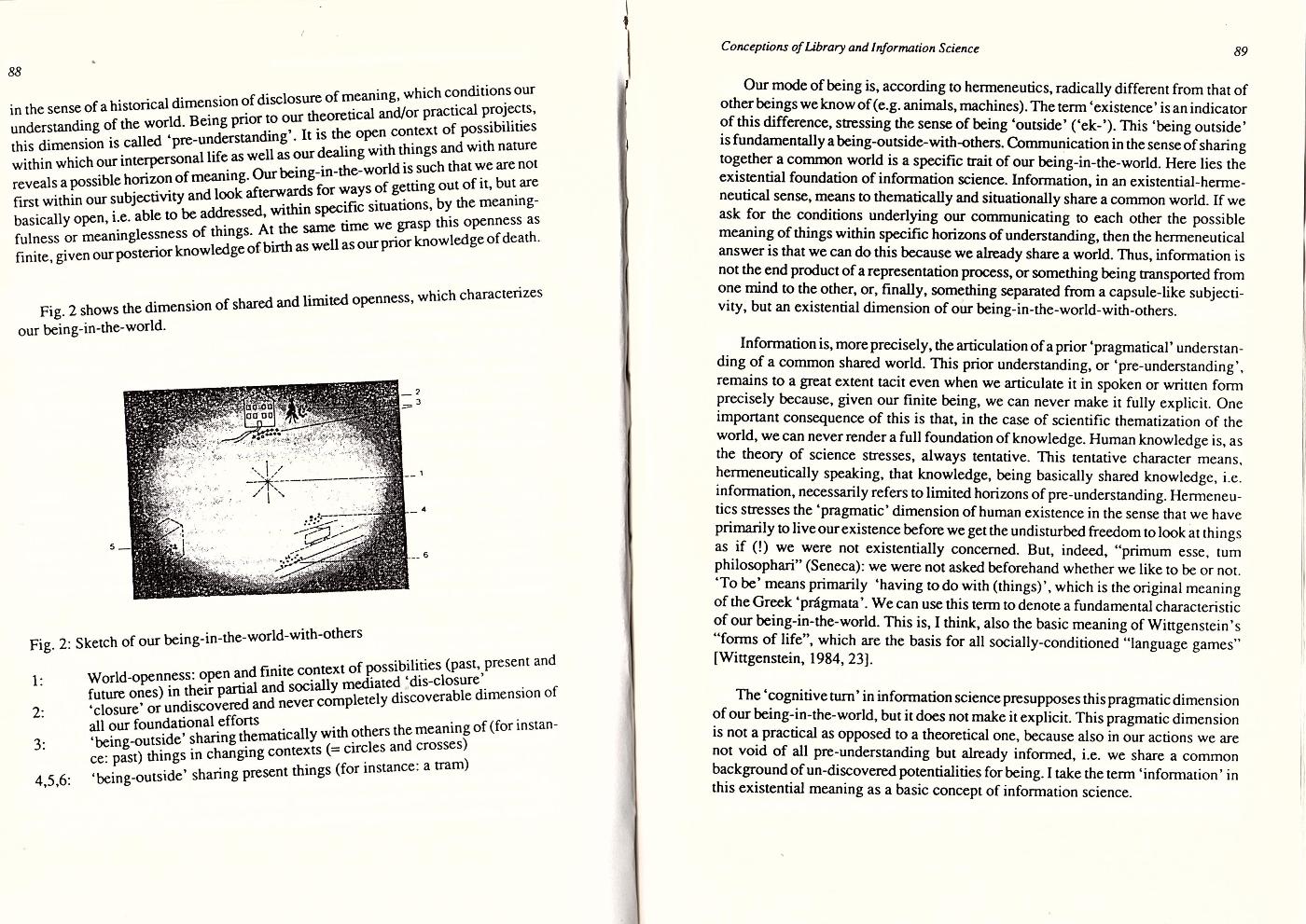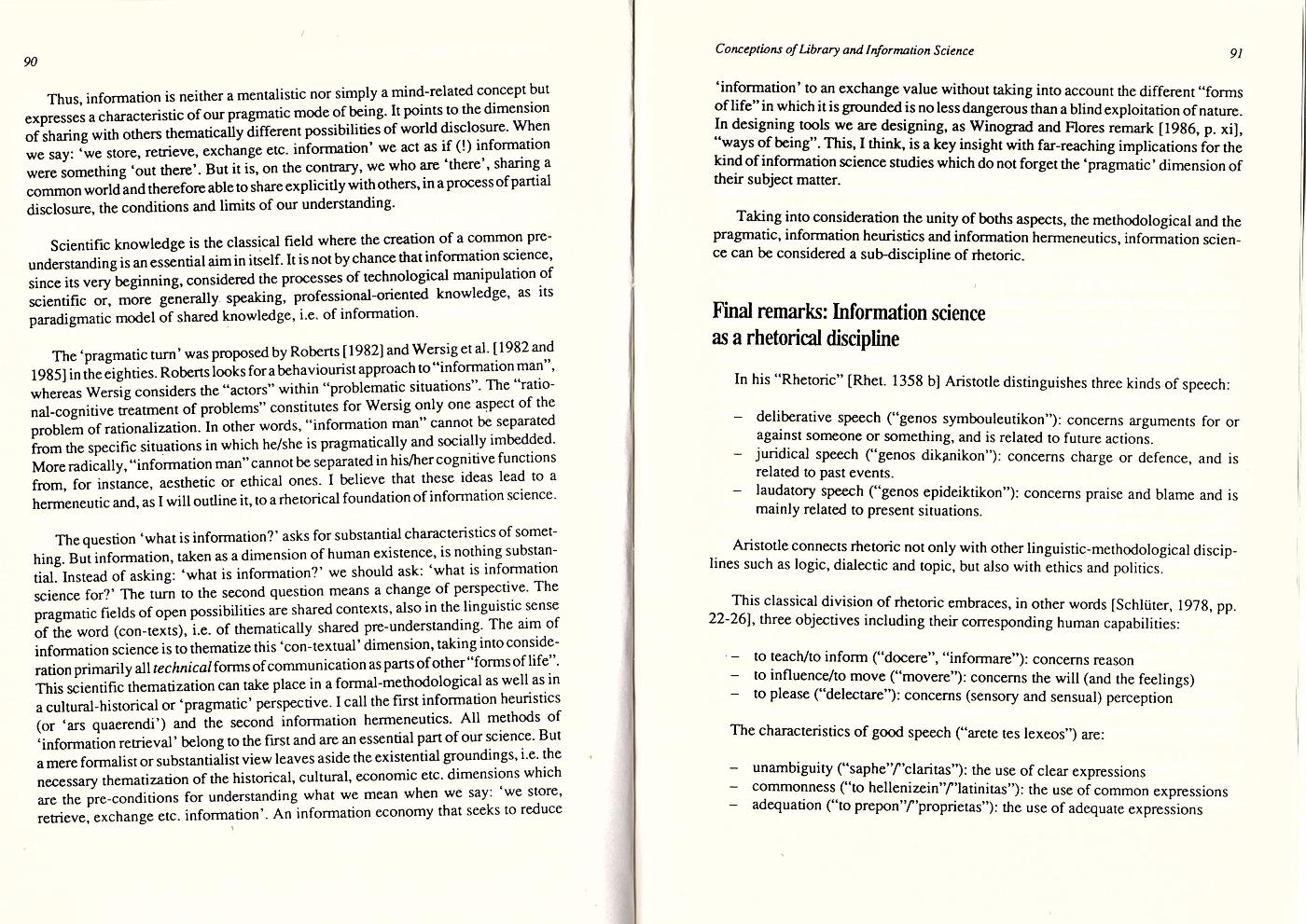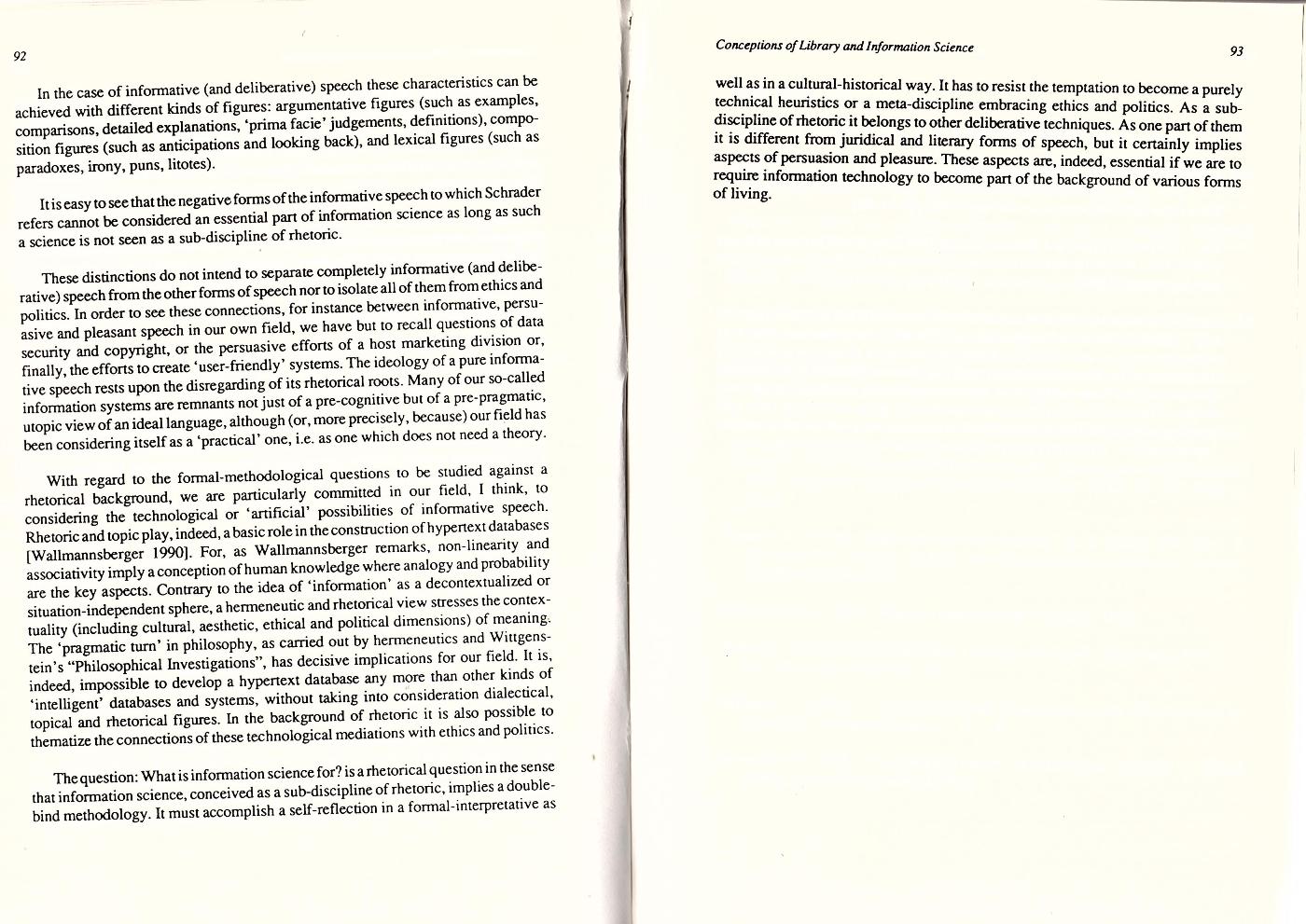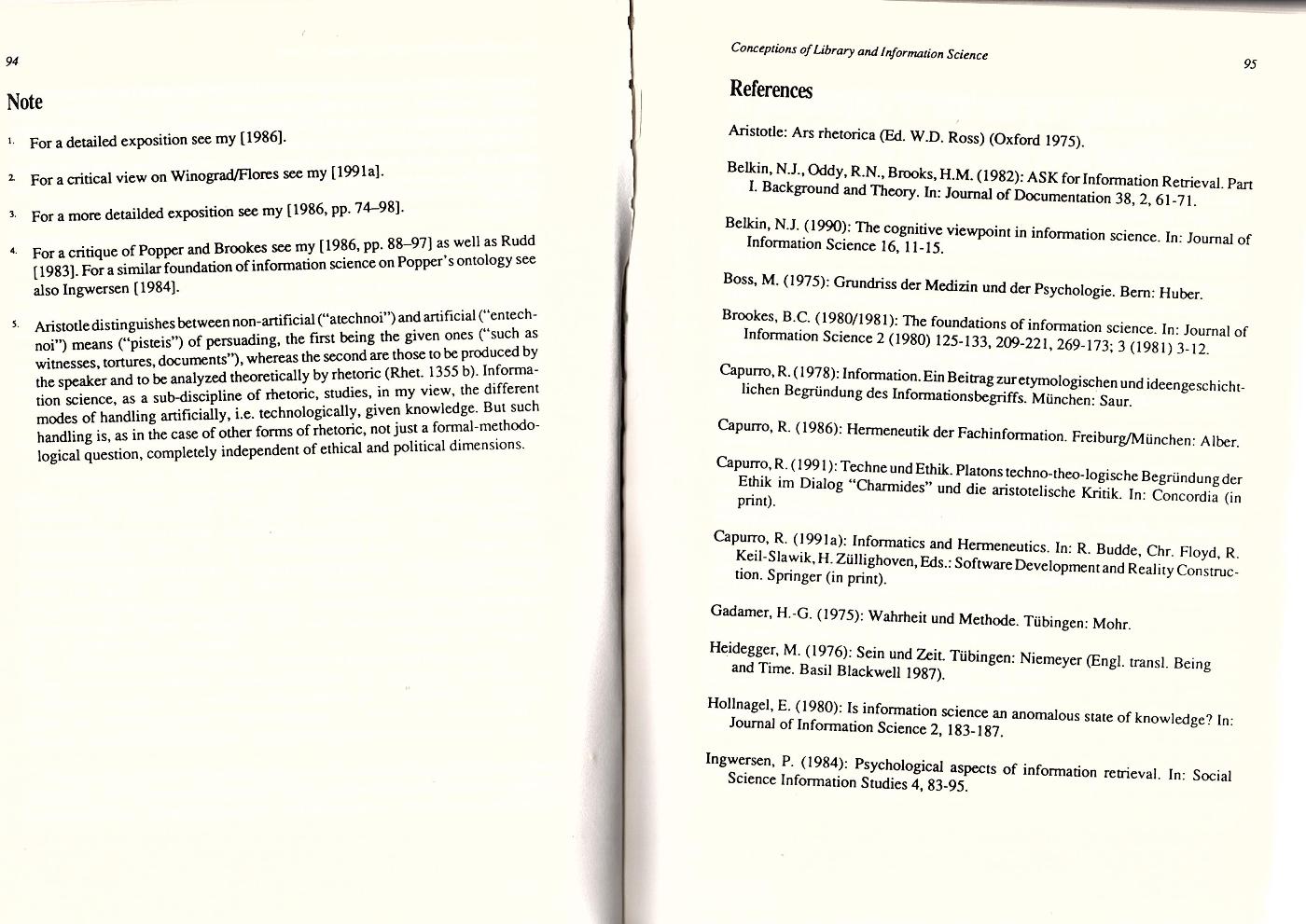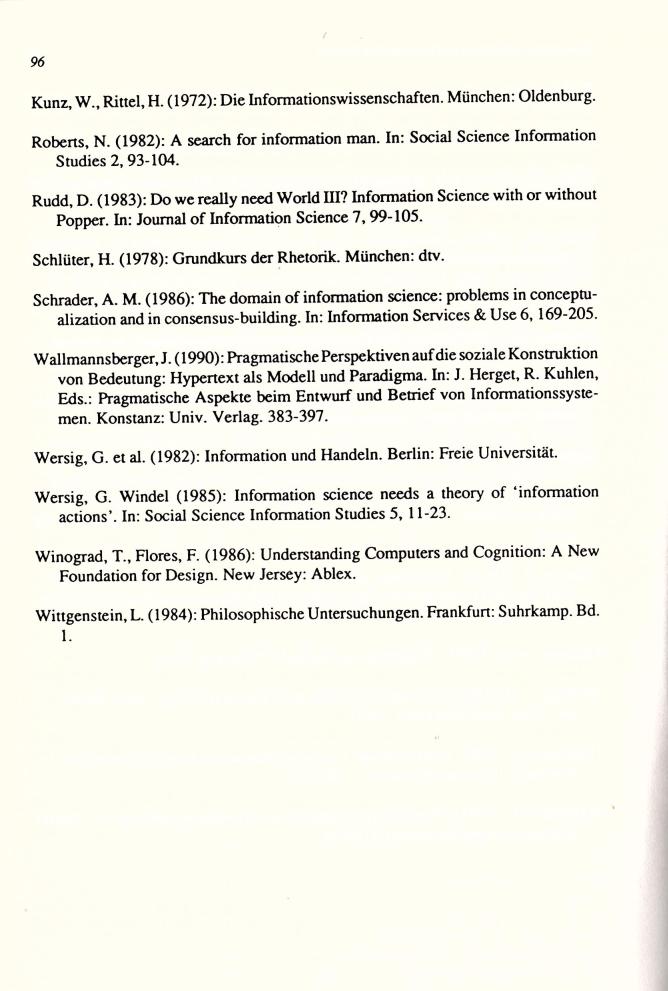III.
INFORMATION SCIENCE AS A HERMENEUTIC-RHETORICAL DISCIPLINE
In
his Rhetoric [Rhet. 1358 b] Aristotle
distinguishes three
kinds of speech:
-
deliberative
speech (genos symbouleutikon): concerns arguments for or against
someone or something, and is related to future actions.
-
juridical speech (genos dikanikon): concerns charge or defence,
and is related to past events.
-
laudatory speech (genos epideiktikon): concerns praise and blame
and is mainly related to present situations.
Aristotle
connects rhetoric not only to other linguistic-methodological
disciplines
such as logic, dialectic and topic, but also with ethics and
politics.
This
classical division of rhetoric embraces, in other words [Schlüter,
1978, pp. 22-26], three objectives including their corresponding human
capabilities:
- to
teach/to inform (docere, informare): concerns reason
-
to influence/to move (movere): concerns the will (and the
feelings)
-
to please (delectare): concerns (sensory and sensual)
perception
The
characteristics of good speech (arete tes lexeos) are:
-
unambiguity
(saphe/claritas): the use of clear expressions
-
commonness (to hellenizein/latinitas): the use of common
expressions
-
adequation (to prepon/proprietas): the use of adequate
expressions
In
the case of informative (and deliberative) speech these characteristics
can be achieved with different kinds of figures: argumentative figures
(such as: examples, comparisons, detailed explanations, prima facie-judgements,
definitions), composition figures (such as anticipations and looking
back),
and lexical figures (such as: paradoxes, irony, puns, litotes).
It
is easy to see that the negative forms of the informative speech, to
which
Schrader refers, cannot be considered as an essential part of
information
science as long as such a science is not seen as a sub-discipline of
rhetoric.
The crucial point underlying the hermeneutic-rhetorical paradigm of
information
science is neither the analogy of information as something physical nor
the representation of reality within an inner sphere, but the
recognition
of the interwovenness of information and misinformation as an
existential
dimension, i.e., as a specific human way of sharing with others the
world
openness. Information and misinformation are, in some way, pseudonyms,
i.e., they are abbreviations for experiences such as "lies, propaganda,
misrepresentation, gossip, delusion, hallucination, illusion, mistake,
concealment, distortion, embellishment, innuendo, deception" (Schrader)
on the one hand, and of telling the truth, communicating publicly our
convictions
and ideas, looking for adequate approaches to all kinds of phenomena,
hearing to what others have to say, letting our fantasy create new
possibilities
of being, developing our sense of reality, cultivating critical
thinking,
as well as other capacities such as righteousness, openness, frankness,
clarity, helpfulness, and truthfulness, on the other.
By
grasping information and misinformation as a dimension of human
existence,
I am suggesting a distinction with regard to other uses of these terms.
This anthropologic (or ontologic) distinction does not imply an
anthropocentric
view. It criticizes a worldless subjectivity representing the things of
the outside world in an encapsulated mind. To exist means, for human
beings,
to be thrown into a field of possibilities with the capacity of
conceiving and misconceiving not only our own (technological) projects,
but also the nature of things that bring themselves forth.
One
fundamental reason for the interwovenness of information and
misinformation
is precisely the finite structure of human existence, our facticity
or thrownness (Heidegger's "Geworfenheit").
Science
remains fallible and all the information we are supposed to store,
retrieve
etc. is to be understood within a possible breakdown situation
(Winograd
and Flores 1986). According to the classical physical paradigm
these
situations should be avoided in order to get relevant results.
For
the hermeneutic-rhetorical approach they are a basis for users
constructions.
The
rhetorical distinctions do not intend to separate informative (and
deliberative)
speech from the other forms of speech nor to isolate all of them from
ethics
and politics. In order to see these connections, for instance between
informative,
persuasive and pleasant speech in our field, we have but to recall
questions
of data security and copyright, or the persuasive efforts of a host
marketing
division or, finally, the efforts to create user-friendly systems. The
ideology of a pure informative speech rests upon the disregarding of
its
rhetorical roots. Many of our so-called information systems are
remnants
of a pre-pragmatic, utopian view of an ideal language, although or,
more
precisely, because our field has been considering itself as a practical
one, i.e., as one which does not need a theory.
With
regard to the formal-methodological questions to be studied against a
rhetorical
background, we are particularly committed in our field to
considering
the technological or artificial possibilities of the informative
speech.
Aristotle distinguishes between non-artificial (atechnoi) and
artificial
(entechnoi) means of persuading (pisteis), the
first
ones being the given ones ("such as witnesses, tortures, documents"),
whereas
the second are the ones to be produced by the speaker and to be
analyzed
theoretically by rhetoric (Rhet. 1355 b). Information science, as a
sub-discipline
of rhetoric, studies the different forms of handling artificially i.e.,
technologically, shared knowledge. But such handling is, as in the case
of other forms of rhetoric, not just a formal-methodological question,
completely independent from ethical and political dimensions. Rhetoric
and topic play a basic role in the construction of hypertext databases.
For, as Wallmannsberger remarks [1990], non-linearity and associativity
imply a conception of human knowledge, where analogy and probability
are
the key aspects. Contrary to the idea of information as a
decontextualized
or situation-independent sphere, a hermeneutic and rhetorical view
stresses
the contextuality (including cultural, aesthetic, ethical, and
political
dimensions) of meaning. The pragmatic turn in philosophy, as carried
out
by hermeneutics and Wittgenstein's Philosophical Investigations,
has decisive implications for our field. Hypertext and hypermedia as
well
as other kinds of intelligent databases and systems, can be
called intelligent as far as they take into consideration
dialectical,
topical and rhetorical figures. On the background of rhetoric it is
also
possible to thematize the connections of these technological mediations
to ethics and politics.
The
question: What is information science for? is a rhetorical question in
the sense that information science, conceived as a sub-discipline of
rhetoric,
implies a double-bind methodology. It must accomplish a self-reflection
in a formal-interpretative as well as in a cultural-historical way. It
has to resist the temptation to become just a technical heuristics or a
metadiscipline embracing ethics and politics. As a sub-discipline of
rhetoric
it belongs to other deliberative techniques. As one part of them it is
different from juridical and literary forms of speech, but it certainly
implies aspects of persuasion and pleasure. This relationship between
rhetoric
and aesthetics within information science needs to be more strongly
emphasized
than I am doing it here. It does not only imply the user-friendliness
or
the ergonomic design of information systems, i.e., the alliance between
information science and information design, as Orna and Stevens remark
[1991], but also takes into consideration, much more basically, the
bodily
or aesthetic (Greek: aisthesis = perception) dimension of human
existence. We should study how information technologies influence the
bodily
possibilities of the users. We need, in other words, an information
science
aesthetics closely related to an information science ethics i.e., to a
critical analysis of the ways in which power structures are imposed on
the (bodies of the) users or, viceversa, to become aware of the
situations
and conditions in which information technology becomes, individually
and
socially, an open field of self creation. One way of doing this is, as
Frohmann proposed [1991], through discourse analysis. Information
science
is a hermeneutic science just because there is no definite separation
between
information and misinformation. Information science is the science of
information
and misinformation.
We
are concerned, as Popper suggested [1973], with problems and not with
subject
fields precisely because problems always arise within changing
(cultural
and historical) horizons or fields (!) of expectations. These terms
belong,
by the way, to the same geographical metaphor (pro-blem = to
throw
before).
The
linear model of human knowledge and action from "facts" to "decisions",
suggested by Hayes [1991], is an idealized description of human
understanding,
which must take decisions in order to establish facts, thus being
involved
in a hermeneutic, i.e., not only intellectual, but also pragmatic
circle.
The
question 'what is information for?' leads to the question 'what is
information
science for?' since information science, conceived as a
hermeneutic-rhetorical
discipline, studies the con-textual pragmatic dimensions
within
which knowledge is shared positively as information and negatively
as misinformation particularly through technical forms of
communication.
These are not just an instrument but a "way of being" [Winograd and
Flores
1986]. This conception of information science is important if we want
information
systems to become part of the background of various forms of
living.
